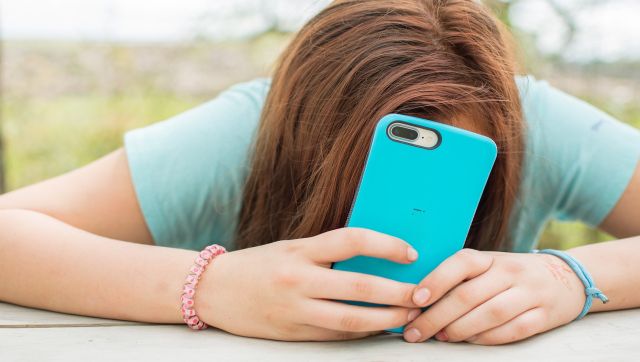Smoking is dangerous to health. And now, so is social media. At least, according to New York mayor Eric Adams, who has classified social media as a “public health hazard” and an “environmental toxin,” saying young people must be protected from “harm” online.
New York City has become the first major city in the United States to take such a step, drawing people’s attention to just how harmful and dangerous social media can be for children.
But what does this advisory mean? More importantly, what risks does social media pose to adolescents and teens? We take a closer look and get you the answers.
Social media, a public health hazard
New York City mayor Eric Adams on 25 January issued an advisory officially designating social media as an environmental toxin.
“Companies like TikTok, YouTube, Facebook are fuelling a mental health crisis by designing their platforms with addictive and dangerous features,” Adams said in the annual State of the City address.
“Just as the surgeon general did with tobacco and guns, we are treating social media like other public health hazards and ensuring that tech companies take responsibility for their products,” said the mayor.
Quick Reads
View AllSocial media companies are fueling a mental health crisis, especially for our young people. But we won't let Big Tech endanger our kids.@NYCHealthCommr Vasan is today issuing an advisory officially designating social media as an environmental toxin in New York City. #SOTC2024 pic.twitter.com/8Rddkzr1hM
— Mayor Zohran Kwame Mamdani (@NYCMayor) January 24, 2024
He added that New York City Health Commissioner Ashwin Vasan “is issuing a health commissioner advisory officially designating social media as a public health crisis hazard in New York City.”
The advisory urges parents and caregivers to prevent kids from obtaining a smartphone or social media access until at least the age of 14. The advisory also asks health care providers to discuss social media with young patients and parents and to help develop social media usage plans for families.
Moreover, they have urged federal and state policymakers to expand on legislative proposals that protect youth from “predatory practices by social media companies”.
Further details on the same would be released at a later date, said Adams then.
US awakens to social media dangers
While New York City is the first to take such a step, medical experts in America have, in recent years, been issuing warnings about social media.
In May 2023, Surgeon General Vivek Murthy had issued an advisory warning that excessive social media use could be a “profound risk” to youth mental health. In an op-ed for The Post, Murthy had written: “In light of the ongoing youth mental health crisis, it is no longer possible to ignore social media’s potential contribution to the pain that millions of children and families are experiencing.”
And heeding warnings from experts, different states across the US are trying to limit or restrict social media for minors. The state of Utah was the first in America to enact laws limiting how children can use social media.
Other states like Texas, Louisiana have followed suit, passing legislation that requires parental consent before kids can sign up for social media websites. Connecticut, Maryland, Minnesota, New Jersey and Ohio have also considered similar laws.
In October last year, over 40 US states had sued Meta for platforms like Facebook and Instagram. At the time, the Meta websites had been accused of designing features that could potentially harm children’s mental health. New York Attorney General Letitia James had stated, “Kids and teenagers are suffering from record levels of poor mental health and social media companies like Meta are to blame.
“Meta has profited from children’s pain by intentionally designing its platforms with manipulative features that make children addicted to their platforms while lowering their self-esteem.”
Harmful impact of social media
Social media is everywhere; it’s hard to ignore. A Washington Post report states that 95 per cent of American teens use some form of social media — be it Facebook, X, Instagram, Snapchat, or TikTok. A 2022 survey by Pew Research Centre found that forty per cent of children 8 to 12 also use social media despite the fact that some social media platforms require users to be 13 years old.
But experts point out that it is especially harmful for young ones, especially adolescents and teens. As the president of the American Medical Association, Jack Resneck Jr was quoted as saying, “With near-universal social media use by America’s young people, these apps and sites introduce profound risk and mental health harms in ways we are only now beginning to fully understand.”
The evidence of its mental health impact is concerning.
A 2012 study had found that checking email and social media is more addictive than cigarettes and alcohol. The study, which was carried out on 205 people, aged 18 to 85, found that most of them were more likely to give in to urge to tweet or check email than other cravings like drinking or smoking.
Apart from this, numerous studies show that adolescent rates of depression, anxiety, loneliness, self-harm and suicide have skyrocketed in the US and elsewhere since around the time that smartphones and social media became ubiquitous.
In fact, the US surgeon when writing about the perils of social media had stated adolescents who spend more than three hours per day on social media have double the risk of depression and anxiety. Furthermore, 46 per cent of adolescents aged between 13 and 17 say social media makes them feel worse about their body image, and 64 per cent of that age group are “often” or “sometimes” exposed to hate-based content.
The New York advisory also had some alarming numbers. It stated that between 2011 and 2021, rates of high-schoolers in the city experiencing hopelessness increased by more than 42 per cent and rates of suicidal ideation increased by more than 34 per cent.
There are other studies too that show a direct impact of social media on the mental health of teens. For instance, in February 2023 researchers at Swansea University in Wales found likely physical health benefits, including a boost to the functioning of the immune system, when social media use was reduced by as little as 15 minutes per day.
Massachusetts Institute of Technology economist Alexey Makarin was quoted as telling ScientificAmerican, “We are not saying that social media can explain 100 per cent of the rise of mental health issues… But it could potentially explain a sizeable portion.”
Experts further note that the content on social media platforms in often toxic or misleading that can cause harm. Often times, the content focuses on topics of self-harm or a sexual nature, which has a negative impact on young minds.
They add that while social media can be negatively impacting adults, it is especially triggering for children and teenagers because they are undergoing a “highly sensitive period of brain development”.
Excessive use of social media has also been linked to a rise in eating disorders. A review of 20 studies published in 2016 had showed that the use of social networks is associated with body dissatisfaction and eating disorders.
Social media companies speak
How have social media companies reacted to the news? While they have remained mum to New York City’s advisory, speaking earlier on Murthy’s statement, a Meta spokesperson had referred to mental health as a “complex issue” and pointed toward other contributing factors such as limited access to health care, the COVID-19 pandemic and academic pressure.
YouTube representatives had told ABC News that they have implemented a variety of safeguards for young users, including adding “digital wellbeing features,” removing content that “endangers the emotional wellbeing of minors or promotes suicide and self-harm,” and “exploring ways to further collaborate with researchers.”
Meanwhile, a TikTok spokesperson has said that the company had added aids to improve youth mental health, such as bedtime reminders and age restrictions.
But if experts are to be believed, it’s not enough. Our young minds need protection, and they need it now.
With inputs from agencies


)

)
)
)
)
)
)
)
)



